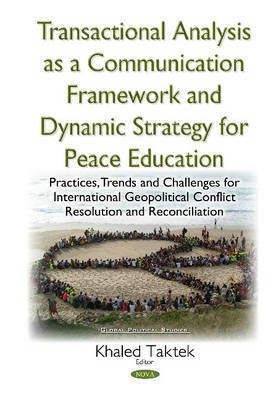Transactional Analysis as an Effective Conceptual Framework & a Dynamic Strategy for Peace Education(English, Hardcover, unknown)
Quick Overview
Product Price Comparison
Grounded in psychology, political science and education, this book presents Berne's Transactional Analysis model used as a novel conceptual framework in order to interpret the diverse political tensions and military operations in the Middle East (e.g., Iraq, Iran, Israel, Lebanon, Palestine) and Afghanistan. Each chapter presents a comprehensive analysis of the geopolitical situation, with the ultimate objective of achieving conflict resolution and reconciliation. Moreover, this book offers a dynamic strategy for the assessment of communication and conduct by leaders of Western countries, especially the United States, the United Kingdom, Canada, Germany, and France. Students, academics, military officers, and political leaders will find an effective communication framework for both understanding geopolitical interactions, and addressing frequently encountered communication issues and challenges at all stages of interpersonal, group, and/or state dynamic development. More particularly, this book seeks to fill the gap between psychology and political sciences, giving students, teachers and researchers a better understanding of how a psychological model of interpersonal communication could be addressed as an inclusive peacekeeping strategy. Moreover, it outlines a roadmap for further research within the field of international relationships and military warfare in order to help improve the added value of education (notably interpersonal communication) in conflict resolution and reconciliation. For practitioners and leaders implicated in crafting political agreements and universal diplomatic harmony, enhanced knowledge relative to the trends related to the enclosure of education in peacekeeping, human rights and democracy can facilitate to shape substantial actions in peace conciliations and orientation strategies. The purpose of these chapters is to provide guidance and basis for reflection to all readers in the realm of education, psychology, sociology, philosophy, military science, and political sciences. More generally, this book is to all those who are concerned with political psychology, group dynamics and leadership, diplomatic and military relationships, conflict resolution and reconciliation, as well as international sustainable peace. This collective work offers comprehensive and multifaceted perspectives arising from different fields with the fundamental goal of achieving an authentic concession, compromise and reconciliation. These perspectives reflect the diversity of approaches and actors involved in the issue of peace, as well as the ultimate quest for an international human dynamic concurrence and a fundamental welfare. Indeed, every education in the modern sense is implicitly or explicitly linked to objective ideas of development, according to an ideal universal harmony.


